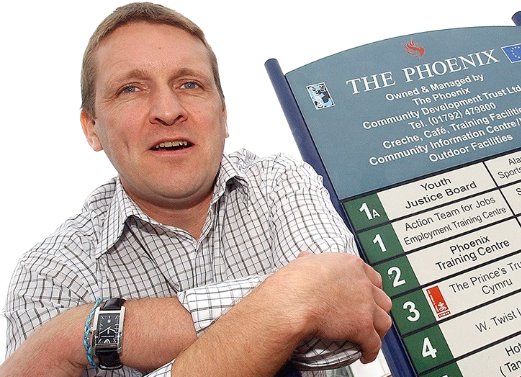Governments can create multi-million pound budgets at the stroke of a pen – and just as easily remove them. So grant funding schemes, the life support system for many local community projects, are vulnerable: schemes can be axed and the financial plug can be swiftly pulled. When Mike Durke CMgr FCMI became CEO of the Hill Community Development Trust (HCDT) in Townhill, Swansea, in 2002 his priority was to plan for the day not if but when grant funding ended. This charitable company was created to build on the only European Union Urban Community Initiative in Wales, and to give local people hope for the future.

Mike Durke CMgr FCMI, senior lecturer at University of Wales Trinity Saint David (UWTSD) and a Swansea councillor
The idea was to take a grassroots approach to tackling long-standing social and economic issues, to get people closer to the world of work, to focus on education and training and provide much-needed community services. The most ambitious part of this plan was that an independent income stream could be created at the same time, thereby reducing the need for government grants and ensuring long-term sustainability.
The purpose-built Phoenix Community Enterprise Centre was to be no traditional “bingo and bowls” community centre. The Phoenix would provide business units for rent, an all-weather sports pitch, a children’s nursery, conference rooms, and a library, with a vibrant community café as its heart. The cynics said it had no chance of working – not in a much-maligned community such as Townhill. They failed to see community spirit, a passion for change and the potential that management ingenuity had for making things work.
Now a senior lecturer at University of Wales Trinity Saint David (UWTSD) and a Swansea councillor, Mike has been a Chartered Manager since 2011. During his 14-year tenure at HCDT, the 100% government-funded enterprise consistently generated £250,000 annually through trading activities. He stepped down in 2014 but the Phoenix continues to be run by volunteer directors, employing 25 local people and without any government grants for its running costs.

Mike Durke CMgr FCMI back when the Phoenix centre was launched
“We were lucky to have directors with very significant commercial experience sitting alongside local residents who understood their community. They whipped me into shape. I completed an MBA so I could understand the language of management, and this led me on my Chartered Manager journey. The process helped me to take a step back and consider where we were and where we wanted to be. The process taught me the importance of planning carefully, of getting everyone on board, doing things right the first time and of maintaining high levels of effective communication.”
“Our approach was more successful than anyone dared to hope on day one,” says Mike who recently designed a new degree in public service and social innovation. “It’s a great example of how urban regeneration can succeed if you embed the roots deep in the hearts and minds of the local community it serves.” And, he can add, its ability to withstand change has been founded on the bedrock of a leader who listened to that community: “the steel thread that holds a community together is intergenerational,” he says. “People have to be engaged and trusted to design and deliver. And if they are, then nothing is impossible.”
More from CMI
- According to CMI, 78% of Chartered Managers believe they’ve had a positive impact on the wider team in their organisation since becoming Chartered.
- Why not start your journey to Chartered today…?
- Discover where your own strengths lie with CMI’s Management Diagnostic tool
- Just because the data’s unreliable doesn’t mean you can’t make decisions
- Become a communication champion with CMI’s skills refresher course
